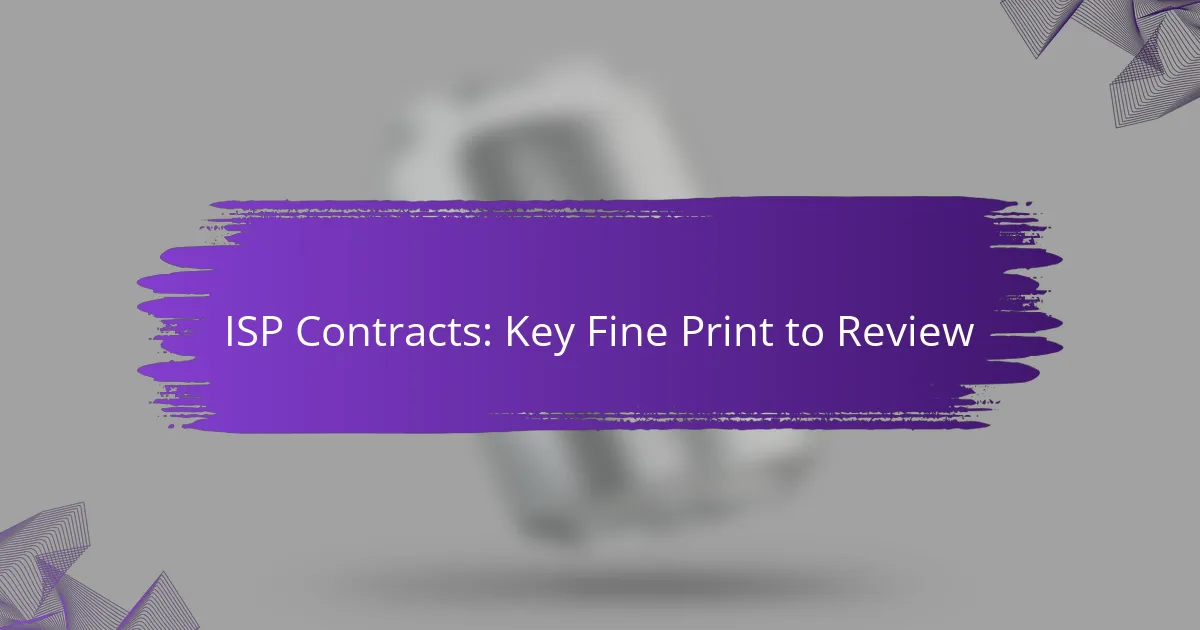When reviewing ISP contracts, it’s crucial to pay attention to the fine print that can greatly affect your service and expenses. Key aspects to scrutinize include early termination fees, data caps, contract lengths, and potential hidden charges. Being informed and proactive can help you negotiate better terms and avoid common pitfalls such as misleading claims and inadequate support.
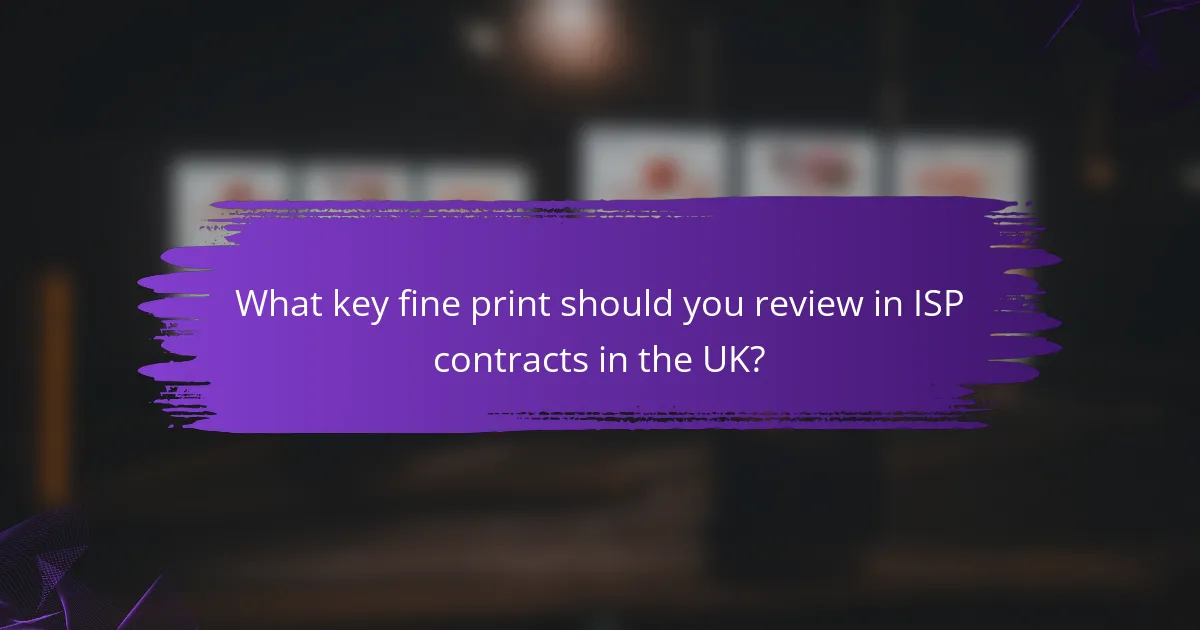
What key fine print should you review in ISP contracts in the UK?
When reviewing ISP contracts in the UK, focus on understanding the fine print that can significantly impact your service and costs. Key areas to examine include early termination fees, data caps, contract lengths, service level agreements, and any hidden charges that may apply.
Early termination fees
Early termination fees are charges you incur if you cancel your contract before its end date. These fees can vary widely, often ranging from £50 to £300, depending on the provider and the remaining contract duration. Always check the specific terms regarding these fees to avoid unexpected costs.
Some ISPs may offer flexible contracts with lower or no early termination fees, so consider these options if you anticipate potential changes in your service needs.
Data caps and throttling policies
Data caps limit the amount of data you can use within a billing cycle, while throttling policies reduce your internet speed once you reach that limit. Many ISPs in the UK impose data caps, typically ranging from 100GB to unlimited usage, depending on the plan you choose.
Review the specifics of these policies to understand how they might affect your internet experience, especially if you stream content or download large files regularly. Look for plans that offer unlimited data if you frequently exceed limits.
Contract length and renewal terms
Contract lengths can vary, with common durations being 12, 18, or 24 months. Be aware that longer contracts may offer lower monthly rates but can lock you in for an extended period. Check the renewal terms as well, as some contracts automatically renew unless you cancel within a specified notice period.
Consider your future needs when selecting a contract length. If you anticipate moving or changing your service, a shorter contract might be more suitable.
Service level agreements (SLAs)
Service level agreements outline the expected performance and reliability of your internet service. They typically include metrics such as uptime guarantees and response times for service issues. In the UK, many ISPs offer SLAs that guarantee uptime of around 99.9%.
Review these agreements carefully to ensure they meet your expectations for service quality, especially if you rely on a stable connection for work or streaming.
Hidden fees and charges
Hidden fees can significantly increase your overall costs, so it’s essential to identify them before signing a contract. Common hidden charges include installation fees, equipment rental fees, and costs for exceeding data limits.
Ask your ISP for a complete breakdown of all potential fees and charges associated with your plan. This transparency will help you avoid surprises on your bill and ensure you select the best option for your budget.
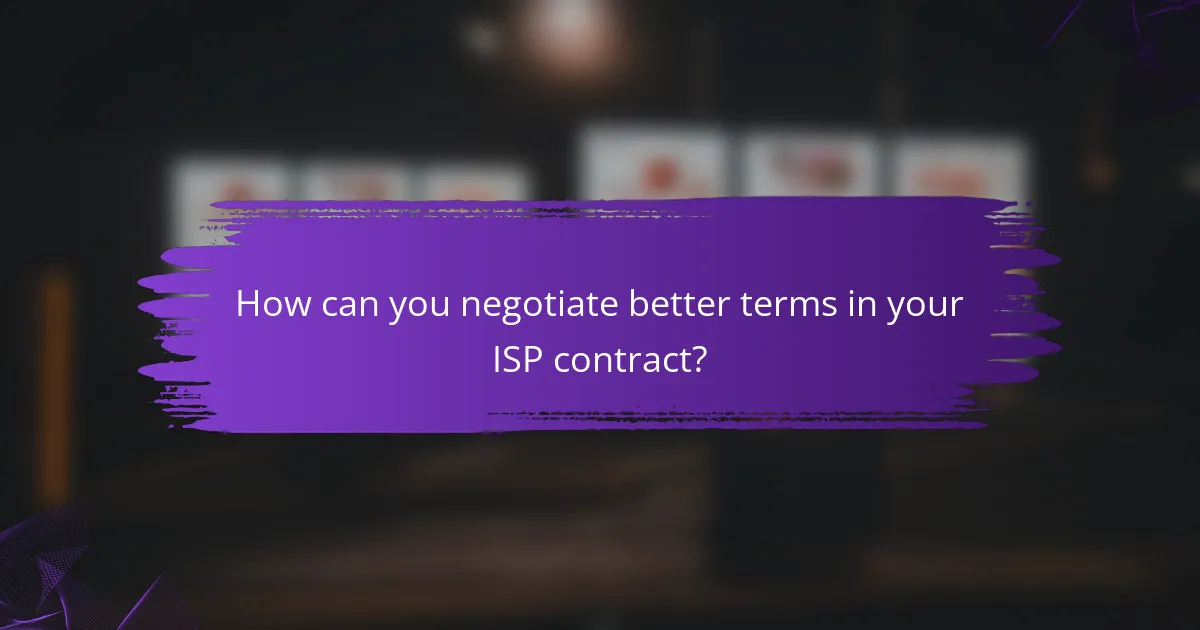
How can you negotiate better terms in your ISP contract?
Negotiating better terms in your ISP contract involves understanding your options and leveraging competitor offers. By researching available deals and being proactive in discussions, you can secure more favorable pricing and conditions.
Research competitor offers
Start by comparing the packages and pricing of different ISPs in your area. Look for promotions that competitors are offering, as this information can serve as leverage during negotiations. Many ISPs will match or beat competitor rates to retain customers.
Compile a list of at least three competitors, noting their pricing, speeds, and any additional features. This will provide you with a clear picture of what is available and help you articulate your needs effectively.
Ask for promotional rates
When discussing your contract, inquire about any promotional rates that may not be advertised. ISPs often have special offers for new customers or for existing customers willing to renew their contracts. These rates can significantly lower your monthly bill.
Be prepared to explain why you deserve a promotional rate, such as being a long-term customer or having found better offers elsewhere. This approach can increase your chances of receiving a discount.
Request flexibility in contract length
Consider asking for flexibility in the length of your contract. Many ISPs offer standard contracts of one or two years, but you may be able to negotiate shorter terms. A shorter contract can provide you with the freedom to switch providers if your needs change.
Discuss options like month-to-month agreements or shorter commitment periods. This can be particularly beneficial if you are uncertain about your long-term internet needs or if you anticipate moving soon.
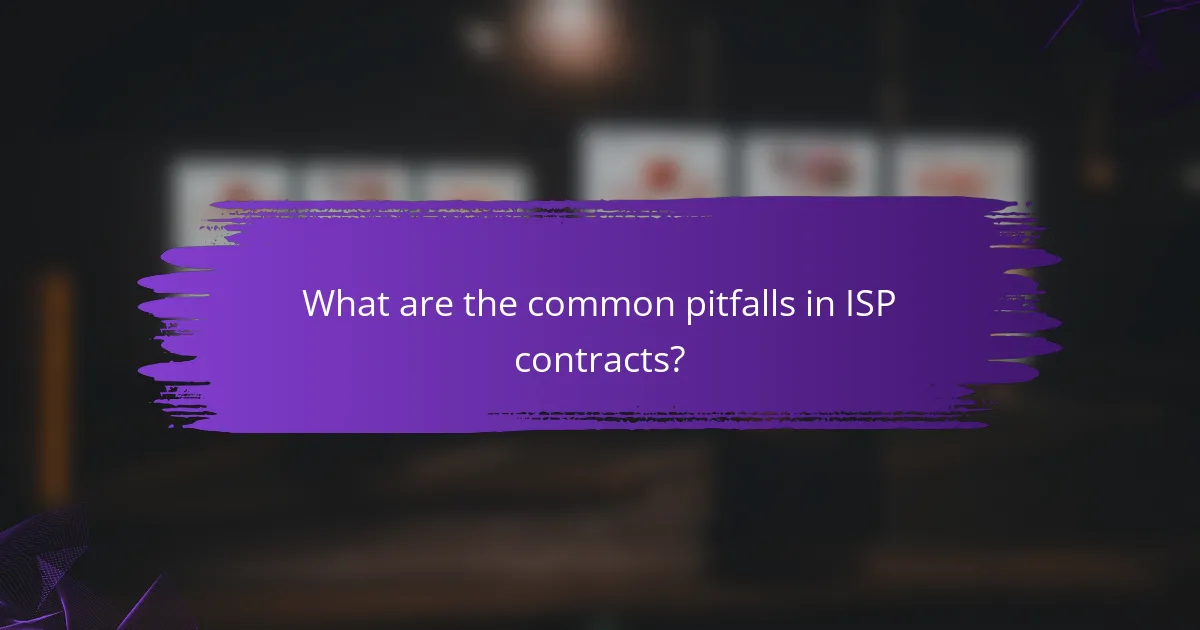
What are the common pitfalls in ISP contracts?
Common pitfalls in ISP contracts include misleading advertising claims, complex language, and inadequate customer support provisions. These issues can lead to unexpected costs, poor service experiences, and confusion about terms and conditions.
Misleading advertising claims
ISPs often promote high-speed internet plans with attractive pricing, but these claims can be misleading. For instance, the advertised speeds may only be achievable under ideal conditions, which are rarely met in real-world usage.
Additionally, promotional prices may only last for a limited time, after which customers could face significantly higher rates. Always check the fine print for details on speed guarantees and pricing structures.
Complex language and jargon
Many ISP contracts are filled with technical jargon and complex terms that can confuse consumers. This complexity can obscure important details about service limitations, fees, and cancellation policies.
To navigate this, look for simplified summaries or ask the ISP for clarification on any terms that seem unclear. Understanding the language used in your contract is crucial to avoid surprises later.
Inadequate customer support provisions
Customer support is often overlooked in ISP contracts, yet it is vital for resolving issues. Some contracts may not guarantee timely support or may limit the methods of contact, such as only offering online chat without phone support.
Before signing, inquire about the support options available, including response times and hours of operation. Ensure that the contract includes clear provisions for customer assistance to avoid frustration during service disruptions.
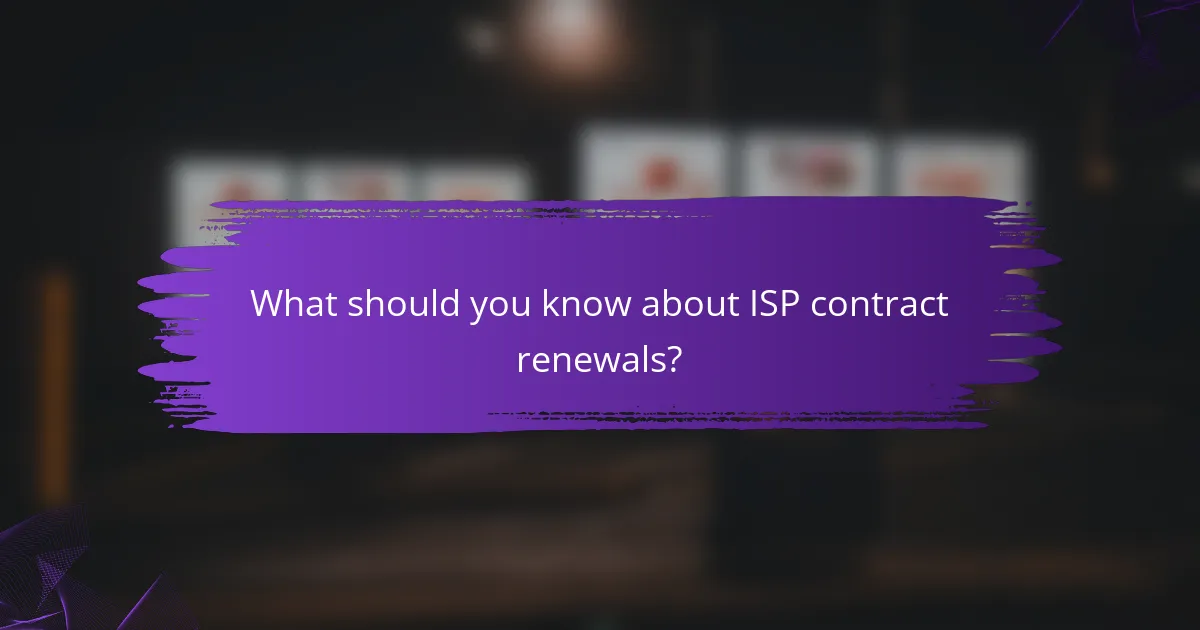
What should you know about ISP contract renewals?
ISP contract renewals often involve automatic extensions of your service agreement unless you take action to cancel. Understanding the terms related to renewals can help you avoid unexpected charges and ensure you are aware of your options.
Automatic renewal clauses
Many ISPs include automatic renewal clauses in their contracts, meaning your service will continue beyond the initial term unless you opt out. This can lead to unanticipated charges if you forget to cancel before the renewal date.
It’s crucial to read the fine print regarding these clauses. Some contracts may automatically renew for a longer period, such as one or two years, which can lock you into a rate that may not be competitive.
Notification periods for cancellation
ISPs typically require you to provide notice of cancellation within a specific timeframe before the renewal takes effect. This period can range from 30 to 60 days, depending on the provider.
To avoid being charged for another term, mark your calendar with the cancellation deadline. Always check your contract for the exact notification requirements, as failing to comply can result in automatic renewal.
Impact on pricing after renewal
After a contract renewal, your pricing may change significantly. Some ISPs offer promotional rates for the initial term, which can increase substantially upon renewal.
Be aware of how much your monthly fee may rise after renewal. It’s advisable to compare the new rate with other available plans to ensure you are getting the best deal. If the new pricing is not favorable, consider negotiating with your ISP or exploring alternative providers.
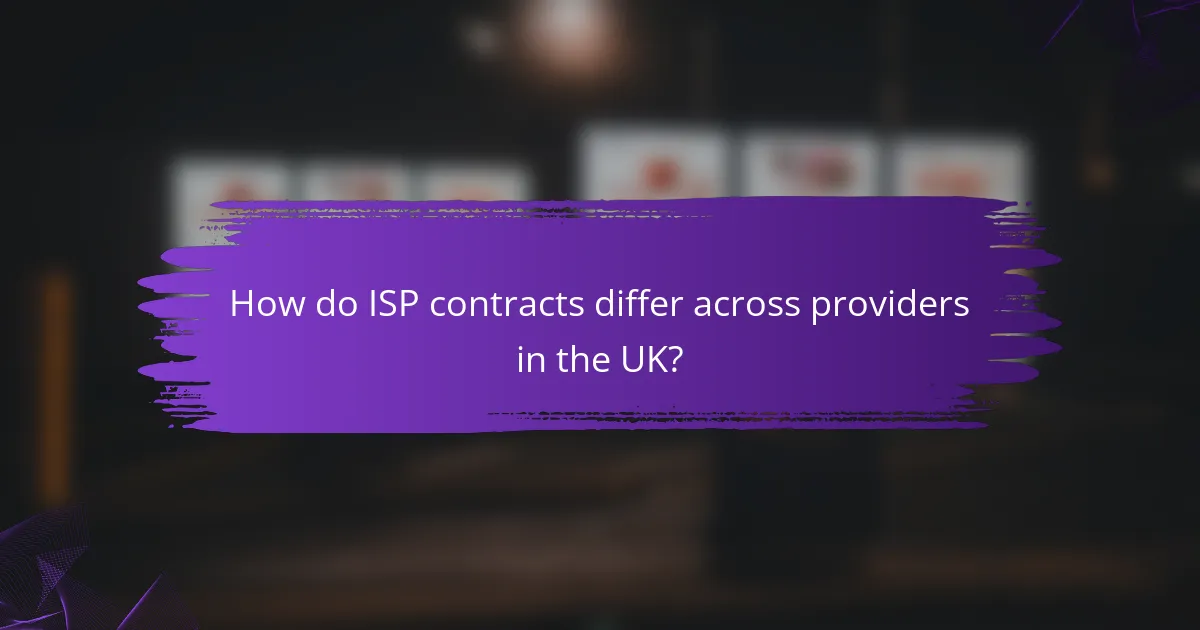
How do ISP contracts differ across providers in the UK?
ISP contracts in the UK vary significantly between providers, affecting pricing, terms, and customer obligations. Understanding these differences can help consumers choose the best option for their needs and avoid unexpected costs or commitments.
BT vs Virgin Media contract terms
BT and Virgin Media have distinct contract terms that can influence your decision. BT typically offers contracts ranging from 12 to 24 months, while Virgin Media often provides options for 18-month or 24-month commitments. It’s essential to consider how long you plan to stay in one location and whether you might need to move before your contract ends.
Additionally, BT may charge early termination fees based on the remaining months of your contract, while Virgin Media often has a flat fee. Always read the fine print regarding cancellation policies and fees before signing.
Sky vs TalkTalk pricing structures
Sky and TalkTalk present different pricing structures that can impact your monthly budget. Sky generally has higher starting prices but often includes additional features like premium channels or bundled services. TalkTalk, on the other hand, tends to offer lower base prices, making it an attractive option for budget-conscious consumers.
When comparing these providers, consider any promotional offers that may apply. Sky frequently runs discounts for the first year, while TalkTalk may have lower ongoing rates. Be sure to calculate the total cost over the contract duration to make an informed choice.
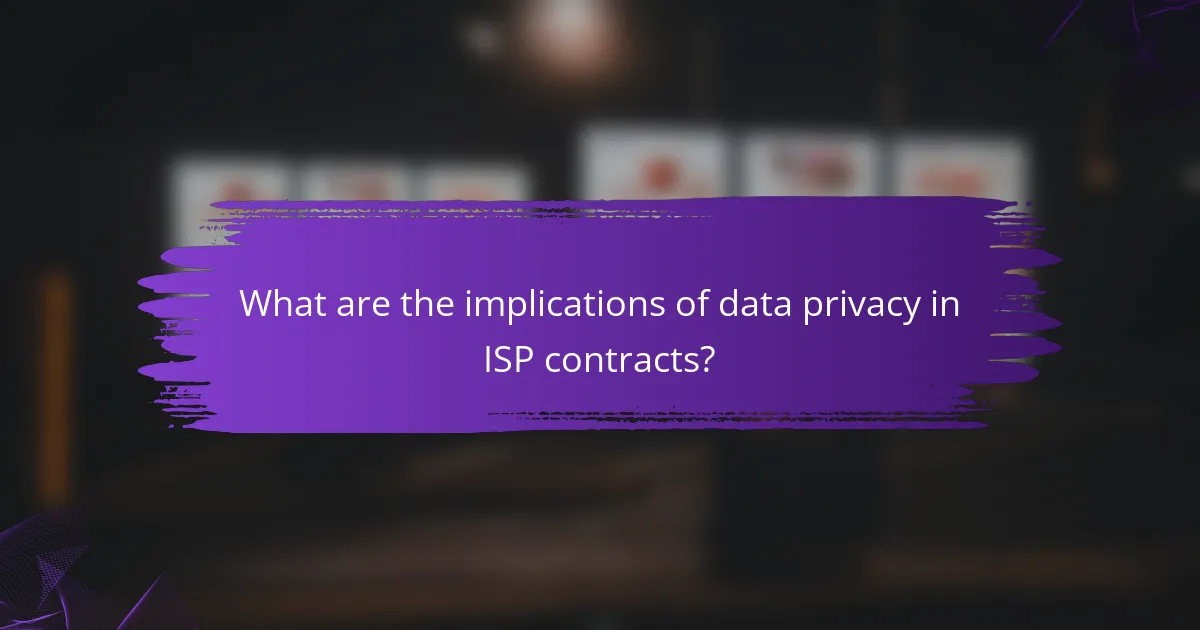
What are the implications of data privacy in ISP contracts?
Data privacy in ISP contracts is crucial as it determines how your personal information is collected, stored, and shared. Understanding these implications helps you make informed choices about your internet service provider and your privacy rights.
Data retention policies
Data retention policies outline how long an ISP keeps your data after you stop using their services. Typically, ISPs may retain your information for several months to a few years, depending on their internal policies and local regulations.
It’s essential to review these policies to understand what data is stored and for how long. Some ISPs may retain browsing history, while others might only keep account information. Look for clear statements in the contract regarding data retention timelines.
Third-party data sharing
Third-party data sharing refers to the practice of ISPs selling or sharing your information with external companies. This can include advertisers, analytics firms, or even government agencies, often without your explicit consent.
Check your ISP’s contract for clauses on third-party sharing. Some providers may offer options to limit this sharing, while others may not. Being aware of these practices can help you protect your privacy and make better decisions about your internet service.
